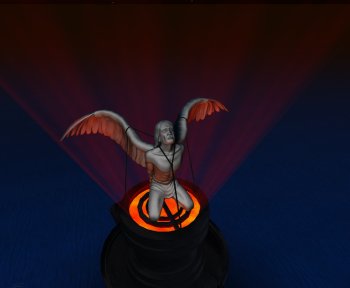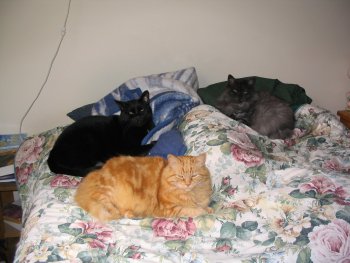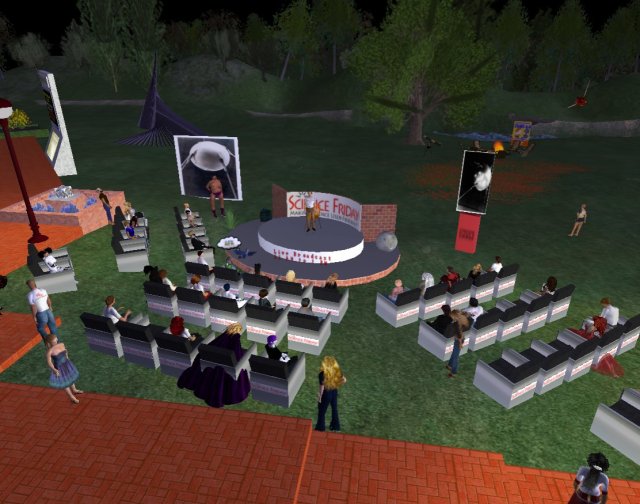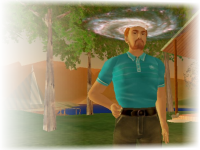A bunch of mindless jerks who were the first against the wall when the revolution came
Posted on December 30th, 2007 — permalink
I refer, of course, to the executives, lawyers, and so-called thinkers behind and among the RIAA. They’ve been making noises about this for a while, but finally they’ve gotten around to trying to hold somebody legally liable for making a copy of a CD for their own personal use (that is, not even to distribute, but just for convenience of listening). I mean, heck, I’ve done this myself, and despite my ideological concerns, I’ve gone out of my way to avoid violating even some too-extreme interpretations of copyright law. How many of us haven’t? And if you think about it, it is impossible to make any use whatsoever of the music on a CD without making at least a transient copy of it, be it just in the soundwaves in the air between the speaker and your ear, or in the nerve impulses in your brain. Where does this extreme overreaching self-righteous behavior come from? Well, from fear, obviously. Amidst all their talks about educating kids about the morality of “stealing” and “protecting artists,” somewhere they recognize that large music publishing companies are fundamentally obsolete given modern technology, and like any frightened and unintelligent animal whose cornered, they’re lashing out viciously in any direction they think they can hit.
The mistake many of the rest of us make is by taking them seriously enough to allow them to hurt us rather than just dying off along with the dinosaurs and buggy whip manufacturers and piano roll sellers.
The world has moved on. Technology is no longer such that for musicians to communicate their music to the world at large, they require the resources of a large music publishing company. Alas, the publishing companies do not want to give up the power that yesterday’s technology granted them. Rather than trying to figure out how to best fit into the modern world, they are trying to criminalize modern technology.
I know a lot of musicians (and writers, and such) get huffy when people make arguments like the one I make, saying that I’m just “rationalizing stealing.” My response is this: we are asking the wrong question. The question we should be asking is not how do we protect intellectual property? Rather, we should be asking how can we insure that musicians and authors and artists are able to be paid and make a living producing the creations we value? The rhetoric, lawsuits, and luddism that we are seeing today in those who support the music industry’s utterly crazy crusade are results of limitations on thinking provided by asking the first question. The first question presupposes an answer to the second question that made sense in an earlier era, but that does not made sense in the modern digital era.
Rather than adapt, the RIAA seems to be going ever further into rectal defilade, ever further down the path of trying to outlaw the flexibility and individual empowerment provided by digital technology in favor of granting their member companies stifling control over anything anybody does with music.
I am sad that our government puts up with this. I am sad that so many creative people think that somehow the crusade of the RIAA is really doing them any good in the long run. I am sad that there are people out there who seem to think that it’s at all a reasonable opinion that there is justification in what the RIAA is doing.
2 Comments
Posted in Free Culture, Politics, Rant |
The art of Light Waves in Second Life
Posted on December 28th, 2007 — permalink
One of the mottos of Second Life is “your world, your imagination.” Second Life has very little content developed or built by anybody employed by Linden Lab. Nearly everything you see in Second Life is built by the residents– that is, people like you who have accounts, and who do creative things with them.

Angel by Light Waves
Click for a larger version
Light Waves is a sculptor in Second Life, and an amazing artist. You can find his pieces here and there (including older pieces created under an earlier name, Starax Statosky) about Second Life. His own region is called Black Swan. I encourage anybody in Second Life to visit it and take a look. The Search result I’ve linked to is at the beginning of a path around the perimeter of that region. You pass by a handful of Light Waves’ sculptures, as well as the occasional pitfall, hole in the path you have to jump over (or, fly– heck, this is Second Life after all), the occasional spike trap, and a lot of atmosphere. At the center is a huge sculpture, enhanced by particle effects that would be difficult to achieve fully in real life.
1 Comment
Posted in Second Life, Second Life Culture |
Science Debate 2008
Posted on December 27th, 2007 — permalink
Sheril and Chris over at The Intersection, along with others, have been beating the drum for “ScienceDebate2008″ for some time now. The basic idea is that we should get the various Presidential candidates together and get them to explicitly address and debate science and science-policy issues. Lots and lots of bloggers have weighed in on this, so don’t expect me to link to them all; I’ll just arbitrarily pick out one post that I liked from Janet Stemwedel and link to that.
Here is my reason for thinking this is a good idea: to reduce the “blank slate” effect that allows people to make bad choices. Although there is this stereotype promulgated by many that scientists (at least of the academic sort) are all flaming liberals pre-biased against the Republicans, that’s not true. The fact is that scientists come from a wide variety of political backgrounds. With a caveat regarding the increasing prominence of creationism in our politics, and also caveats regarding the kinds of things Stephen Pinker wrote about in The Blank Slate, it’s possible to be an exceptional scientist while holding a wide diversity of political views. Mind you, most scientists will believe that any rational person will come to the same conclusion that they have, because scientists tend to be like that. (”I’m really smart, therefore anybody really smart will agree with me.”) But science doesn’t tell us the right division for market forces versus government intervention, it doesn’t tell us about the morality of wealth redistribution versus individual empowerment, etc.
However, the fact that politicians so rarely address science– other than spouting the usual rah-rah “we want to support innovation and high-tech jobs” kind of stuff in sound bytes– allows scientists to project whatever they want to see on the candidate they would choose for other reasons. Mind you, this transcends science. I remember in 2000 watching some people project potential anti-Microsoft-Monopoly potentials on Bush, which is of course a joke. I’ve also seen people project libertarianism on Nader. And so forth.
The fact that politicians so rarely address science allows scientists to vote for politicians who will be disasters for science without realizing what they’re doing. To my point of view, a science debate wouldn’t so much be an actual debate, where issues are hashed out, as a place where politicians were really forced to put enough of their cards on the table that it would be harder for us to kid ourselves in the way that we kidded ourselves in 2000. (Presumably scientists who voted for Bush didn’t believe he would be the disaster for science that he has turned out to be.) I like Janet’s ideas– let’s see who they ask, and what kind of things they say. Let’s find out who really understands something about science, and also understands that they don’t really understand science… and let’s find out where they’re going to be going to get scientific input– or, as in the case of Bush, “support”– for their policies.
There is, of course, one candidate who’s views on science are unambiguous. That would be Huckabee the Creationist, who has come forward with a clear declaration of ignoramusitude. Other than him, though, we may be kidding ourselves regarding Democrats and Republicans alike when we think that any given candidate whom we prefer for other reasons will be better than the mess we’ve got right now. Let’s try to get them talking about it as best possible. Even given the fact that debates are PR-soundbyte prepackaged shams, which soundbytes candidates choose will be useful information.
Comments Off
Tags: election, Politics, president, Science, science & policy, sciencedebate2008
Posted in Politics, Science |
Ron Paul FTL
Posted on December 25th, 2007 — permalink
So… after hearing that Ron Paul was one of only two congresscritters who voted against an asinine law to further cyberparanoia, and knowing that he’s been described as a libertarian, I began to think that, hmm, perhaps there might be a Republican worth a slight further look even though I’ve forsworn that party after the disaster that is George W. Bush and the continued support he gets from his party despite clear evidence of disaster.
Well, alas, that slight further look has happened, and while it seems that Republicans may disagree about the intrusiveness of government into our lives, the one thing the candidates may be willing to agree upon is being ignorant about modern science. It’s sad that this is what the Republican party seems to be showing as its true unifying core.
At the moment, as best I can tell, I’m an Obama man all the way. Further thought will be required.
6 Comments
Posted in Politics |
A slight overreaction
Posted on December 23rd, 2007 — permalink
I bemoan the overcommercialization of Christmas as much as anyone, but I think that perhaps this reaction is a bit on the extreme side.
Update 2007-12-25 : Jennifer Jacquet at Shifting Baselines has drummed up a picture.
Comments Off
Posted in Gratuitous |
3 Sleepy Kitties
Posted on December 20th, 2007 — permalink
It’s my blog, and I can post gratuitous cat pictures if I want to!

Left to Right : Harry Boxlee, Buttercup, and Zeus.
2 Comments
Posted in Kitties! |
Proposed Blog Meme : How Big a Terror Suspect Are You?
Posted on December 19th, 2007 — permalink
Check out this post on Nobody’s Business (which I found via BoingBoing).
Here’s what we should all do. Go down the list on the flyer from the Chicago Police Department, and see how many of them we’ve done. Here’s mine:
- Physical Surveillance : oh yeah. I’ve done everything on the sublist. Binoculars, cameras, video (I think), and, hey, using maps (even though I am a man) in public.
- Attempts to gain sensitive information regarding key facilities : not so much. I don’t think. Not that I don’t anticipate I might do something like that that in the future; heck, when you’re a gamer and you run roleplaying games, finding things like the floor plan for the pentagon or a nuclear plant can be very useful!
- Attempts to penetrate or test physical security / response procedures : Yep. I’ve tried the locks on locked doors before. I’ve also used a coat hangar to open the lock on a car door. It was my car, but still. And I was doing this in public. They should have locked me up.
- Attempts to improperly acquire explosives, weapons, ammunition, dangerous chemicals, etc. : not so much. I have made a lot of attempts to improperly split infinitives, because I’m a Star Trek fan.
- Suspicious or improper attempts to acquire official vehicles, uniforms, badges, or access devices : a bit. I was a marine captain in a play once, and wore a uniform (sort of). When I was at Caltech, I (along with every other student, graduate or undergraduate) had and made copies of various master keys… which was a (successful) improper attempt to acquire an access device.
- Presence of individuals who do not appear to belong in workplaces, business establishments, or near key facilities : sure. Ever been asked if you were lost? Means you didn’t appear to belong. Honestly, I do agree that this is something people should be aware of… not for terrorism reasons, but for common petty theft reasons. Calling 911 may be a bit of overkill.
- Mapping out routes, playing out scenarios, monitoring key facilities, timing traffic lights : All of the above. Hell, every time I drive somewhere new, I map out a route. As for playing out scenarios, yeah, done that, generally using GURPS as the rules set…. Monitoring key facilities? I mean, I wouldn’t think anybody would want to, say, monitor the land (and water) near a power plant…. Timing traffic lights? Hell yeah. Every Monday night in grad school, coming back from orchestra rehearsal, I’d get on Green Street (a one way street) and hit pretty much every single light. It was awesome.
- Stockpiling suspicious materials or abandoning potential containers for explosives (e.g. vehicles, suitcases, etc.). Insert obligatory joke about living in the South and abandoning a vehicle on your front lawn. I’ve got quite a giant stockpile of boxes left over from the last move in my attic. Does that count? I’m counting it.
- Suspicious reporting of lost or stolen identification : I’ve actually done this, and it was even suspicious. See I had a credit card that was lost for a year. It was never misused, so it was really lost. Never found it. I mean, I still used it, because I knew the number, but the card itself was lost. Finally I got over the procrastinatory activation barrier and called the company to have a new number issued. Isn’t that a bit suspicious? “Uh, yeah, a year ago I lost my credit card….” Given that you can use credit cards as a secondary form of ID, I think I’m a full-on terror suspect here.
How did I do? Six (counting two “halves”) out of nine. Geez! If you aren’t alarmed by me, then you are not a Good American who cares about the safety of his or her country! Heighten your awareness!
3 Comments
Posted in Fight Terror with Terror, Politics, Rant |
Hello Time! Please mention Nathan Smith, Robert Quimby
Posted on December 12th, 2007 — permalink
Time has their own personal list of the top 10 scientific discoveries of 2007. Seven out of the ten are in biological related fields— although a couple are paleontology, that is related to the history of life on earth. One is chemistry, and two are astronomy. Of the two in astronomy, one was really just continuing discoveries that have been ongoing for more than the last decade (the discovery of hot jupiters).
The other astronomical “top discovery” is about Supernova 2006gy, the most luminous supernova ever recorded, and the supernova of a star that was more than 100 times the mass of the Sun. Stars this massive are extremely rare. Your routine supernova (which only happens about once per century per galaxy) comes from a supernova more like 8-10 times the mass of the Sun.
As I was browsing through these, though, I hit this story and realized: hey, I know about that one! And here’s what bugs me about this a little bit. We live in a culture where hero-worship is key. Individual scientists win Nobel Prizes, even though huge numbers of them contribute to the discovery. Name recognition in the media and amongst your colleagues is of tremendous value and import, especially as resources to fund science get more scarce. University administrations will be in love with scientists who pull lots of positive press to themselves, but (as I know from personal experience and watching Vanderbilt’s administration suffer rectal defilade when thinking about other groups in the Physics department) members of collaborations who aren’t seen as “the leader” are highly undervalued by administrations and (at least in astronomy) funding agencies alike.
As such, it was sad to me that no names were attached to this. The original paper has a list of authors including some (Craig Wheeler, Alex Filippenko) who are not at all suffering for any kind of public recognition. However, the first author (Nathan Smith) is a post-doc… and post-docs are in a truly vicious world where any lost opportunity for recognition is a slight. I’m also personally familiar with Robert Quimby, who was a “post-bach” working with the Supernova Cosmology Project between undergraduate and graduate school, and who went on to graduate school at the University of Texas. The discovery of this supernova came out of searching related to his thesis work. So while it may sound great to say that the Chandra Space Telescope observed (allowing the reader to infer “discovered”) this, in fact there was effort from a lot of people, including people at the low end who are going to be fighting for recognition and resources in a vicious world of individual hero worship.
1 Comment
Posted in Physics & Astronomy, Science, Vicious Academia |
In San Francisco for a week
Posted on December 10th, 2007 — permalink
I’m in San Francisco for a week, visiting the main SF Linden office for the first “DNOC Summit”. The DNOC is the “Distributed Network Operations Center,” the group that I’m in at Linden. Although I’ve only been working there since August, I am now more senior than the DNOC median…. This is a new group that was put together starting with Neuro Linden. The idea is to have operations folk (i.e. system engineering type people) who are online and monitoring the cluster 24/7 during their normal working hours. This means to zeroth order following the Sun, with people in time zones around the world, although of course not everybody’s normal working hours coincide with the sun (especially among computer people). We’ve got five people in the DNOC now, with hopes of continuing to grow.
This week I’ll be meeting in-person for the first time a number of people that I’ve been working with and have talked with extensively. Alas, I foolishly forgot to bring my camera with me, so don’t expect any juicy insider Linden photos here.
I’ll be staying with my father, who lives on a “floating home” in Alameda. It’s a great deal that when I visit the Linden head office, I get to stay with him. Not only does this mean I get free (i.e. company reimbursed) travel to visit my father, sister, brother-in-law, and nephew, but also I save the company a lot of money by saving them hotel costs while I’m out there.
2 Comments
Posted in Linden Lab, Personal Updates, Second Life |
NPR’s Science Friday, live, in Second Life
Posted on December 7th, 2007 — permalink
Drop by today at 11AM PT to Science School in Second Life to be part of the live studio audience of Science Friday. If you don’t have a Second Life account… make one! A basic account is free!

This is one of the really cool things that happens in Second Life. NPR’s Science Friday has been part of it’s Talk of the Nation show forever. For the last couple of months, they’ve had a live studio audience in-world. What this means is that between 40 and 100 Second Life avatars (usually including Prospero Linden) show up to listen to the show. The audio stream attached to the land is Nashville’s WPLN (I had nothing to do with that, but appreciate it!) . There is an avatar in-world, Ira Flatley, to represent Ira Flatow… although since the real Ira is broadcasting live on the radio, it’s actually a member of his staff running the avatar. Those of us sitting around have a lively conversation in text chat about what we’re hearing on the radio. (Sometimes the conversation wanders a bit from there.) Basically, it’s sitting around with a bunch of fellow science fans all together listening to this national science broadcast. (Well, really, it’s international, since the stream works anywhere, and many of the people who show up aren’t ‘from the USA.) Also, Ira Flatley is listening to the comments and questions we ask, and occasionally one will be read by Ira Flatow on the radio. There was a week when he said “Prospero Linden in Second Life asks….”
4 Comments
Posted in Science, Second Life, Second Life Events |



